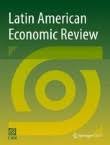
Lo más reciente
We use the stochastic frontier approach to estimate the reservation wage across different city groups in Colombia. We use the information of GEIH from 2008-2019 of 23 urban cities. We find empirical evidence in favor of the search theory predictions that suggest a positive relationship between the reservation wage with the level of education and the net family labor income. We also find a gender gap in the reservation wage and explore this gap, controlling by the level of education and the presence of children in the household. Contrary to the results found in the literature, we find that the presence of children reduces the reservation wage of women and men. Finally, we found that the reservation wage increases with the development and productivity of the cities.


 Carlos Esteban Posada
Carlos Esteban Posada